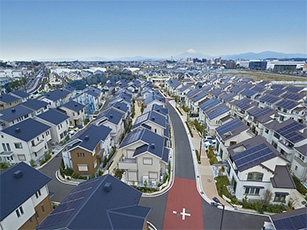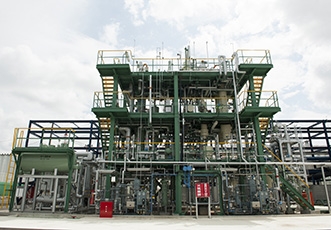Climate Change
Japan's leading companies in climate change measures 1



The importance of enterprise power in climate change measures
Implementation of the Paris Agreement requires drastic reduction of greenhouse gases (GHGs) produced by social and economic activities and adaptation to the impact resulted in climate change. In order to achieve “2℃ target” in the Paris Agreement, pursuing reduction of GHGs globally through innovation is critical. At the same time, tackling climate change by promoting investment and enhancing cooperation to ensure climate finance is also important. The involvement of various non-state stakeholders such as private sector, local government, and civil society are essential as stated in the Paris Agreement and the COP decisions.
The global trend achieving low-carbon society is irreversible and Japanese companies contribute to tackling climate change and realizing sustainable society through their own goods and services. Experiencing economic growth while tackling climate change can be achieved by leading-edge initiatives presented below, which are only small part of measures taken by Japanese companies. The Japanese government further cooperates with private sectors in steadily implementing the Paris Agreement.
Japanese companies’ domestic & global leading-edge initiatives
Renewable Energy 100% (RE100)
| RICOH | [A precision equipment manufacturer which produces multifunction printers and printing machines, IT solution for offices, and semiconductor] RICOH is the first Japanese company to join the RE100. RICOH aims to zero emission through its business by 2050 and it will engage in promoting energy-saving activities strictly. It also aims to consume at least 30% of electricity from renewable energy by 2030 and to achieve to make it 100% by 2050.
|
|---|
[note] Renewable Energy 100% (RE100) is an international initiative that companies, which aim to achieve 100% usage of renewable energy required for their business, join in. (Website: http://there100.org/ )
)
Energy used < Energy created
| Panasonic Corporation | [General electronics manufacturer handling home, housing, automotive, and B2B equipment] Based on the Panasonic Environment Vision 2050, Panasonic is working to create factories with zero CO2 emissions as well as to develop energy-saving products to reduce the energy used during production and during product use. In addition, Panasonic also focuses on creating/utilizing energy through photovoltaic power generation, storage batteries, and hydrogen energy, aiming for a society with clean energy and a more comfortable living. |
|---|
Energy supply
(Hydrogen Energy)
| Chiyoda Corporation | [An integrated engineering company specializing in industrial facilities, particularly oil refineries and LNG facilities] Hydrogen, once considered a distant dream energy source, has become a reality: Chiyoda Corporation has made it easy to transport it safely in a liquid at ambient temperature and pressure. It will complete construction of the world’s first hydrogen supply chain from overseas (Brunei Darussalam) to Japan (Kawasaki's coastal region) in 2020, a giant step towards a zero-emission society.
|
|---|
(Photovoltaic Generation)
| XSOL | [A comprehensive solar power generation company] XSOL will deploy solar power generation by providing comprehensive services including planning, procurement, construction, and maintenance of solar power generation. It analyses market trend of solar power generation in Japan and advocates for robust increase of the solar market in Japan.
|
|---|---|
| Solar Frontier | [A company which produces, sales and exports photovoltaic cell] Solar Frontier is the world’s largest provider of CIS solar panels, system solutions and services. Its solar panel technology delivers economical and environmental advantages in real-world conditions. It harnesses the power of the sun to provide a cleaner, more comfortable life for people all over the world. |
| Kuni Umi Asset Management Co. Ltd. | [A company that engages in infrastructure business which focus on renewable energy, regional development and cross-border business] Utilizing renewable energy, Kuni Umi Asset Management Co. Ltd. aims to create sustainable economic system: “Sun-Based Economy.” One of the largest mega solars: 235MW in being developed in Japan located in Setouchi City, Okayama Prefecture, (expected to operate in Spring 2019). The plant will produce sufficient energy for power about 70,000 households, and it is expected to reduce half of the CO2 emissions in Setouchi City, approximately 192,000 tons per year.
|
(Renewable Energies such as hydropower generation)
| JAG Seabell Co. Ltd. | [A company which engages in R&D, manufacturing and sales of, and consultation on renewable energy equipment] JAG Seabell Co. Ltd. engages in R&D, manufacturing and sales of, and consultation on renewable energy equipment. Taking into account the irrigation system as adaptation measures introduced in developing countries, it develops hydropower generation system which enables to produce electricity with about 3m waterfall. I contribute to the mitigation in developing countries such as India, Viet Nam, Myanmar, Ethiopia, and Kenya as well.
|
|---|
(Biomass Carbonization Apparatus)
| Meiwa Co., Ltd. | [A small-sized enterprise that aims to build closed-loop society by converting organic waste into agricultural charcoal] Meiwa Co., Ltd. develops, manufactures, and sells biomass carbonization plants that create charcoal from organic waste such as sewage sludge, animal waste, garbage and water hyacinth among others. Because such charcoals are powerful as natural fertilizer, soil improvement material and water-retaining material, this technology contributes to better organic waste management, more resilient agriculture and self-sustaining food security strategy as well as environmental protection. It is particularly effective in developing countries that face challenges in waste disposal and/or dryland agriculture due to excessive concentration in urban population and changes in rainfall patterns associated with climate change.
|
|---|
Housing and building related energy-saving/ Smart City/ Town development focusing on disaster prevention and reduction
| SEKISUI HOUSE | [A company which engages in planning, construction, and managing house and development related work] SEKISUI HOUSE achieved selling 28,195 houses which are ZEHs from 2013 to the end of March 2017, and it occupies 74% of new housing sales in FY2016. The effect of accumulating sales of low carbon modelled housing from 2009 to 2016 is equivalent to 300,000 ton-CO2/year reduction. It aims to achieve CO2 zero emission through housing lifecycle by 2050 and to realize decarbonized community.
|
|---|---|
| Shimizu Corporation | [A general building enterprise] Shimizu Corporation It sets a medium- and long-term target “Shimizu Ecology Mission 2030-2050” which aims to reduce 80% CO2 emission from buildings compared to the level in 1990 by 2050 and contribute to tackling climate change.
|
| LIXIL Corporation | [A company in the housing and building industry, delivering human-centric innovation that enhances people's living spaces] LIXIL Corporation sets “Environmental Vision 2030” which aims to achieve a NETZERO Environmental Footprint from our entire business process, as a part of med-term and long-term target related to “Water Conservation and Environmental Sustainability”, and provides environmentally sound products and services such as low-carbon, water-efficient and high insulation technology. It also continues to tackle global hygiene issues through our business such as Safe Toilet (Sa To) initiative. |
[note] Net Zero Energy House (ZEH) is housing which combines energy saving system and energy generation and results in zero net energy consumption.
Energy-saving in transportation
| ANA Group | [An airline group connecting Japan and the world] ANA Group sets a medium-and long-term environment plan for 2012-2020 “ANA FLY ECO 2020” and promotes conservation of environment. It engages in climate change measures such as introducing energy-saving equipment and preparing to introduce bio jet fuel in order to reduce CO2 emissions from jet fuel. |
|---|
Decarbonization and energy-saving using ICT
| FUJITSU | [A provider of comprehensive solutions in information and communication technology (ICT)] FUJITSU has established its “FUJITSU Climate and Energy Vision,” which aims to bring the company’s CO2 emissions to zero by 2050, and contributes globally to the realization of a decarbonized society through its technologies and services that support digital innovation. The Vision will contribute to energy-saving and other mitigation measures, in areas including transportation and manufacturing, with the development and utilization of AI, IoT, and other cutting-edge ICT, as well as adaptation measures such as the introduction of early warning systems for disaster preparedness.
|
|---|
Consulting and Financing
| Mitsubishi UFJ Morgan Stanley | [The securities company of the Mitsubishi UFJ Financial Group engages in financial instruments business and consulting services] Mitsubishi UFJ Morgan Stanley Securities seeks to promote projects that contribute to GHG emissions reduction in developing countries such as through development of methodologies for quantifying emissions reduction achieved from the Joint Crediting Mechanism (JCM) |
|---|---|
| ORIX Corporation | [A multidirectional company which engages in business such as financial service and generating electricity through renewable energy globally] ORIX Corporation engages in generating electricity through renewable energy such as solar power and energy-saving projects in order to tackle environmental and energy issues globally. In Asia, it established a private equity fund called “Asia Climate Partners (ACP)” with Robeco Groep N.V. and Asia Development Bank, which invests in environmental energy and low carbon related projects, and contribute to solve environmental issues.
|
| NTT DATA INSTITUTE OF MANAGEMENT CONSULTING, Inc. | [A research and consulting company of business, economic and social related matters] NTT DATA INSTITUTE OF MANGEMENT CONSULTING, Inc. engages in supporting private sectors exporting Japanese low carbon technologies to developing countries using schemes such as JCM |
In addition to the above, the Japanese government highlighted some Japanese companies which are active in promoting business in the field of adaptation. Please see following links.



 (Open a New Window)
(Open a New Window)